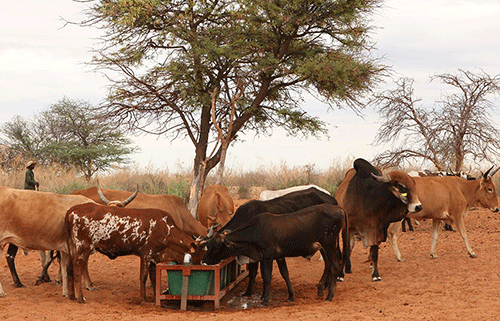Urban and rural development minister Erastus Uutoni said there is a need to reduce Namibia’s heavy reliance on the agriculture sector. Speaking yesterday at the Bank of Namibia’s 24th annual symposium taking place under the theme ‘Transformation of the rural economy in Namibia’, Uutoni deemed it crucial to increase rural income from other economic streams.
Namibia’s rural economy is mainly characterised by agriculture. However, this sector faces growing domestic competition from the urban areas for labour and water. Market access, financing land ownership and lack of agro-inputs are also distinctive challenges amongst rural entrepreneurs.
The minister noted the agricultural sector is constrained and underperforming with only a 5% contribution to gross domestic product (GDP). However, he said agriculture remains a crucial sector to promote economic growth, food security and poverty alleviation.
Despite Namibia’s great strides in improving the rural areas through several cross-cutting policies and strategies and given the positive economic growth realised over the past decades, the country continues to face severe challenges such as extreme poverty and inequalities. This is as 17.4% of the population remains poor, 33.4% are unemployed and youth unemployment stands at a staggering 46.1% across all regions.
“Technology is advancing, which is an important element of entrepreneurship in rural areas. Therefore, digital connectivity cannot be overemphasised. I wish to caution here that these products and services must be provided at an affordable cost. It might be futile if the price of electricity and data is not affordable for people,” Uutoni signalled.
Over 650 000 Namibians, about 30% of the population, are regarded as food insecure. About 70% of the population depends on agriculture for income and livelihoods. Smallholder farmers, Uutoni noted, many of which depend on rainfed agriculture, are vulnerable to the devastating impact of climate change.
The minister further shared that making financial services available to rural populations and leveraging digital solutions are critical for rural economic transformation.
Furthermore, he alerted that the BoN seminar is timely as it comes when his ministry is in the final stages of commencing a review of the national rural development policy and strategy.
Thus, Uutoni assured that government continues to set ambitious plans to transform the rural economy and address vexing challenges, including limited financial resources.
According to him, there is a need to be creative and use all available resources to leverage much-needed private sector investment to alleviate poverty and create jobs.
Also at yesterday’s central bank symposium, BoN director of research, Emma Haiyambo shared some recommendations, stating government needs to reform land tenure to enable rural communities to retain some control over land use for security purposes.
“Namibia should invest in infrastructure development like rural road upgrading, affordable rural electrification, and access to financial services,” she recommended.
Moreover, BoN governor Johannes !Gawaxab alleged that Namibia’s rural areas seem to have been forgotten and have become zones of economic misery. This is because many of the rural areas are plagued by high poverty levels, unemployment and limited access to basic services.
The governor made these remarks yesterday while setting the scene for the annual symposium, which is a forum designed to bring together policy experts, academics, and economic development stakeholders to discuss economic and policy issues.
“This is also coupled with the phenomenon of essential service providers, including financial institutions, shying away from these areas, which exacerbates inequality and financial exclusion, amongst others. The disparity between rural and urban areas not only undermines overall economic development but also exacerbates social inequality and hinders the country’s progress towards achieving Vision 2030 goals,” stated !Gawaxab.
The governor further addressed the well-attended one-day event reflecting on three key aspects, which he said if prioritised would lead to rural transformation. This could include the promotion of sustainable agriculture, the development of rural infrastructure, and support of the informal sector.
He added that agriculture still holds the key to rural economic transformation. To revive and transform the rural economy, the governor advised that Namibia makes agriculture a business, where agri-entrepreneurs are grown and nurtured.
Limited access to electricity and inadequate water supply hinders rural economic growth and discourages investment, said the governor.
“Unlocking the potential of rural Namibia will require a new legislative framework. The land tenure system is a prohibitive factor contributing adversely to citizens and businesses alike, especially not exploiting the full potential of communal areas where many Namibians live. Access to financing through converting title deeds into some form of tradable leasehold, which may unlock funding, is required. This, in turn, can boost agricultural productivity and tourism activities in communal areas,” said !Gawaxab.



